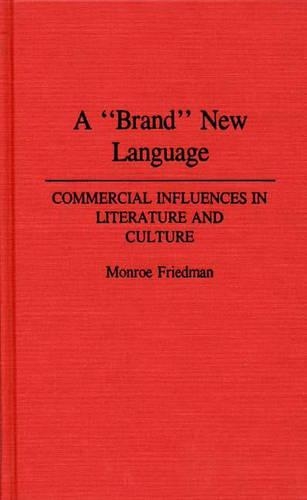
A Brand New Language: Commercial Influences in Literature and Culture
(Hardback)
Publishing Details
A Brand New Language: Commercial Influences in Literature and Culture
By (Author) Monroe Friedman
Bloomsbury Publishing PLC
Praeger Publishers Inc
28th February 1991
United States
Classifications
Tertiary Education
Non Fiction
Literary studies: c 1900 to c 2000
422
Physical Properties
Hardback
200
Description
In the years since World War II, what began in the United States as a shift from a wartime to a peace-time economy soon led to a massive outpouring of a new commercial offering of consumer products and services accompanied by unprecedented efforts to market these commodities. How, Monroe Friedman asks, did these extraordinary commercial developments change the American people over the course of the post-war period. He offers the beginnings of an answer to this, and many other related questions, by bringing together the individual components of a recently completed series of studies on changes in language used in the popular literature of the United States since 1945. The study asks how literature has been influenced by commercial developments. Brand names were used as the indicator of linguistic influence, and detailed content analyses were conducted to examine trends in the use of brand names in popular literature contexts. The first chapter provides background information for the individual studies and the last chapter attempts to make sense of their aggregate findings. Several intervening chapters examine the results of content analyses of popular novels, plays, and songs of the postwar era. Additional chapters look at the use of brand names in newspaper reporting of non-business stories, as well as the symbolic communication functions of brand names in both humorous and non-humorous writings. The penultimate chapter uses test data from "consumer reports" to analyze the quality of the consumer products whose brand names are frequently used in the popular literature of the post-war era.
Reviews
"A "Brand" New Language represents an invaluable study of the growing pervasiveness of commercialism in American culture. Focusing on novels, plays and popular songs, Friedman demonstrates that writers have increasingly used brandnames, then raises important questions about the impact of this use of consumers and society."- Stephen Brobeck Executive Director Consumer Federation of America
"Brand-name dropping isn't new . . . Dr. Friedman said that since World War II, the use of product names as puns, metaphors and punchlines in films, novels and plays has been proliferating faster that street vendors selling fake Rolexes. Although such references abound in contemporary fiction and were the foundation for pop art, this trend is deeply disturbing to self-styled culture cops who decry the commercialization of language. Shakespeare managed with elegant metaphors. . . But contemporary authors often dot their works with what Dr. Friedman calls "metaphors for the mundane." Coinages like "Teflon candidate," "McPaper," the "Edsel of" whatever and assorted detergent references abound in the professor's book."-Joan Kron The New York Times December 6, 1992
"Monroe Friedman has opened a novel window on to our consumer culture. This is a rigourous and humane treatment of the brand of reality that marketers and consumers create in consort. The book will delight the casual reader, and goad teachers and researchers into bolder forays into the world of goods. This is the Baedeker of K-Mart realism."- John F. Sherry, Jr. Associate Professor of Marketing Northwestern University
. . . Social science researchers will admire the scope and ambition of Friedman's undertakings. . . To his credit as a researcher, Friedman doesn't take sides, instead he gives us the data that documents what many will find a significant development in popular culture. A "Brand" New Language is a useful addition for several purposes--for courses in such disciplines as language, language change, mass communication, American studies and popular culture; for researchers interested in following Friedman's quantitative and qualitative explorations; and for the general reader interested in language and popular culture.-Advancing the Consumer Interest
." . . Social science researchers will admire the scope and ambition of Friedman's undertakings. . . To his credit as a researcher, Friedman doesn't take sides, instead he gives us the data that documents what many will find a significant development in popular culture. A "Brand" New Language is a useful addition for several purposes--for courses in such disciplines as language, language change, mass communication, American studies and popular culture; for researchers interested in following Friedman's quantitative and qualitative explorations; and for the general reader interested in language and popular culture."-Advancing the Consumer Interest
Author Bio
MONROE FRIEDMAN is Professor of Psychology at Eastern Michigan University in Ypsilanti. Long active as a researcher and consultant, he has contributed more than a hundred articles and paper presentations to the field of consumer affairs. He is a past president of the American Council on Consumer Interest and a former editor of the Journal of Consumer Affairs. He has also served in Washington as a Congressional Fellow and a research consultant to the White House Office of Consumer Affairs, the U.S. General Accounting Office, the Consumer Interests Foundation, the Federal Trade Commission, and the National Science Foundation.
